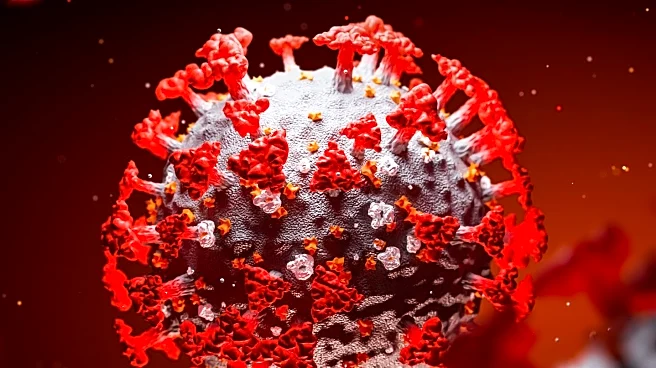What's Happening?
Health funds in Israel have reported a significant increase in COVID-19 cases over the past few months, with a notable rise in hospitalizations. The increase is attributed to the emergence of new variants, Nimbus (NB.1.8.1) and Stratus (XFG), which are more transmissible. Despite the rise in cases, vaccination rates in Israel remain low, with fewer than 50,000 people vaccinated last year. This is in stark contrast to other Western countries where vaccination rates are higher. The Health Ministry has updated its vaccination recommendations, urging people aged 65 and older, as well as those in risk groups, to get vaccinated. The new vaccines available will be Novavax, targeting the JN.1 strain.
Why It's Important?
The rise in COVID-19 cases and low vaccination rates in Israel highlight a significant public health challenge. The situation underscores the importance of vaccination in controlling the spread of the virus and preventing severe illness, especially among vulnerable populations. The low vaccination uptake could lead to increased hospitalizations and strain on healthcare resources. Additionally, the emergence of new variants poses a risk of further outbreaks, emphasizing the need for continued public health efforts to promote vaccination and awareness. The situation in Israel serves as a reminder of the ongoing global challenge of managing COVID-19 and the critical role of vaccines in mitigating its impact.
What's Next?
The Health Ministry's updated vaccination recommendations aim to increase vaccination rates, particularly among at-risk groups. The introduction of the Novavax vaccine, which targets the current dominant strain, is expected to enhance protection against the virus. Public health campaigns may be necessary to address vaccine hesitancy and misinformation, which have contributed to low vaccination rates. The effectiveness of these efforts will be crucial in preventing further increases in COVID-19 cases and hospitalizations. Monitoring the situation and adapting strategies as needed will be essential to managing the ongoing pandemic.
Beyond the Headlines
The low vaccination rates in Israel reflect broader challenges in public health communication and trust. The rise of anti-vaccine sentiment and misinformation has complicated efforts to achieve high vaccination coverage. Addressing these issues requires a multifaceted approach, including transparent communication, community engagement, and addressing concerns about vaccine safety and efficacy. The situation also highlights the need for global cooperation in managing the pandemic, as new variants can emerge and spread rapidly across borders. Strengthening healthcare systems and ensuring equitable access to vaccines remain critical components of the global response to COVID-19.









